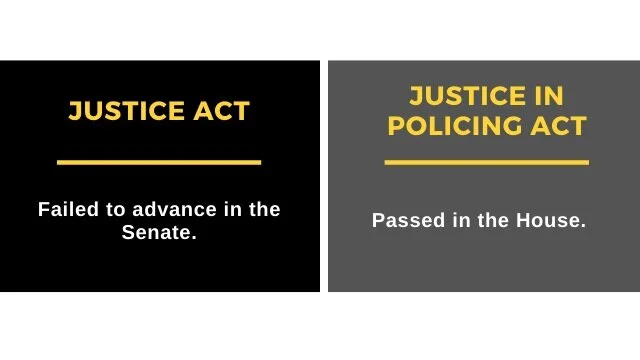Law Enforcement Reform: Which Bill Do You Support?
KEY THEMES
Politics
Law Enforcement
location
United States
KEY SOURCES
Justice in Policing Act
Justice Act
WHY THIS QUESTION MATTERS:
We live in some of the most partisan times in recent history. As our political leaders react to the ongoing calls for law enforcement reform, various competing bills have emerged at the federal and state level.
Today, we’re taking a look at two competing federal bills. One bill, The Justice in Policing Act, was passed in the House with very little cross-party support and is expected to stall in the Senate. The other bill, the Justice Act, was already rejected in the Senate based on its lack of cross-party support. Thus, progress on these reforms is effectively at a standstill based on a lack of cross-party collaboration.
How do these competing bills differ? How are they similar? Get the facts below and see where you land.
BACKGROUND:
Before we get into the bill comparison there’s a few important details to note:
It’s a Federal Bill: Keep in mind that both bills discussed are at the federal level. Meaning reforms proposed for state and local law enforcement must be carried out by the various departments across the country. The proposals rely on the threat of a loss of federal funding for many of the suggested changes.
No-knock warrant: Both bills discuss no-knock warrants, which is a search warrant authorizing police officers to enter certain premises without first knocking and announcing their presence or purpose prior to entering the premises. Such warrants are issued where an entry pursuant to the knock-and-announce rule (ie. an announcement prior to entry) would lead to the destruction of the objects for which the police are searching or would compromise the safety of the police or another individual.
Use of Force: Reasonableness of a particular use of force must be judged from the perspective of a reasonable officer on the scene, and its calculus must embody an allowance for the fact that police officers are often forced to make split-second decisions about the amount of force necessary in a particular situation.
GENERAL CRITIQUES:
While this article will compare and contrast the Justice Act and Justice In Policing Act side-by-side, there are a few general critiques of both bills that are worth noting.
Federalization: One critique leveled against both bills is the tendency for the bills to shift more power and standard-setting from local law enforcement to federal law enforcement and regulation. State officials generally oppose and local district attorneys oppose in principle, although not always in practice, the expansion of federal criminal law into matters that have traditionally been governed by state criminal law. The U.S. Constitution established a federal government of limited powers. A general police power is not among them. That authority is largely reserved for the states.
Funding: For advocates of “defunding the police,” both bills actually increase spending on law enforcement. While the ACLU has endorsed the Justice in Policing act, they also level criticism, saying “the legislation also provides hundreds of millions more to law enforcement, and for the ACLU, that’s a nonstarter. While many of the reforms in this bill are laudable and vital, more must be done to change the role of police in our society fundamentally.”
Let’s get into the research.
THE COMMON THREAD:
Law enforcement should effectively serve the community and be held accountable for their wrongdoings.
FIND YOUR THREAD:
Supporters of the JUSTICE ACT say that the Justice in Policing Act goes too far and that eliminating qualified immunity will strip officers of needed protection. Supporters of the JUSTICE IN POLICING ACT say that the Justice Act does not go far enough, particularly when it comes to qualified immunity reform.
What do you think?









Subscribe to our weekly email to cast your vote on a fresh topic every week.






